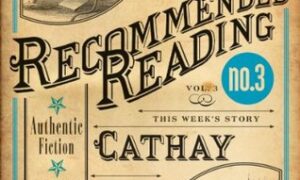 Byron: Great Thinkers on Modern Life by Matthew Bevis
Byron: Great Thinkers on Modern Life by Matthew Bevis
My rating: 3/5 cats



‘I am about to be married—and am of course in all the misery of a man in pursuit of happiness.’
i think byron would be tickled and his friends horrified to know that his life and work were being mined for advice on life and…wait for it…relationships. let that percolate for a bit.
this is a fine book, although i always get a little grumpy when people do close-readings of texts in order to support some pet project or argument you know the author wouldn’t agree with if he were alive enough to be consulted. i can’t see byron having any interest in teaching life lessons to anyone.
in fact, on page one, the book itself expresses skepticism with its own objective:
It should be conceded at the start that Byron is not convinced that you can get life lessons from books. ‘Who was ever altered by a poem?’ he said. ‘Reading or non-reading a book will never keep down a single petticoat.’
and he’s correct.
it’s so strange to me that byron is one of the authors included in this series.
The Great Thinkers on Modern Life series, part of The School of Life, shows how these wise voices from the past have urgently important and inspiring things to tell us.
that sounds like the kind of line byron would use to get you into his backseat. “c’mon, baby—i have urgent and inspiring things to tell you! in my PANTS!”
“thinking” doesn’t seem to be something byron troubled himself with overmuch. in my head, thinking is equivalent to stasis, and byron is all energy: dynamic emotions, powerful, if oftentimes temporary, feelings: ‘Opinions are made to be changed—or how is truth to be got at?’ byron’s too busy living to spend time thinking, and who’s got the time for teaching or planning or consequences?
I ne’er decide what I shall say, and this I call
Much too poetical. Men should know why
They write, and for what end; but, note or text,
I never know the word which will come next.
however, the lessons in this book do seem to be the kind of lessons a study of byron could teach, since they are mostly concerned with self-confidence and are more entrenched in physicality than cerebral pursuits. i still disagree with a lot of the interpretations/conclusions, but that’s just because if there’s one thing i learned in undergrad, it’s that anyone’s words can be twisted to mean any damn thing.
How to Become Yourself
i found this chapter problematic because this is not a lesson that can be learned from byron, whose personality was so changeable and who, as the first real “celebrity,” became known more for a mythology based on a largely fabricated reputation than for his real “self.” bevis addresses this, and the chapter slants in the direction less of “finding oneself” than “constructing oneself”: Rather than trying to improve ourselves, perhaps we could aim to invent ourselves. To imagine a self can be to create one.
which, i mean, i guess, but how lame is that? what’s the point of creating a persona unless you’re in a position where you need the insulation against constant public scrutiny? even then it’s pretty silly. and it sounds exhausting. this “lesson” goes into the category of “things byron can get away with, but you? not so much.”
and this:
We need to wake up each morning enquiring not just: ‘What will the day bring me?’ but also: ‘Which me shall I bring to the day?’
no, matthew bevis, this is exactly what we don’t need. that’s crazytown right there.
How to Think with Your Body
in this chapter, byron obsesses about his clubfoot and makes some sexxy puns and bevis tells us that Dance, we could say, is a form of thinking with your body which is pretty much the philosophy behind Center Stage, right??

but more to the point, there’s this great byron quote about self-delusion:
What an antithetical mind!— tenderness, roughness—delicacy, coarseness—sentiment, sensuality—soaring and grovelling, dirt and deity—all mixed up in that one compound of inspired clay!
It seems strange; a true voluptuary will never abandon his mind to the grossness of reality. It is by exalting the earthly, the material, the physique of our pleasures, by veiling these ideas, by forgetting them altogether, or, at least, never naming them hardly to one’s self, that we alone can prevent them from disgusting.
[Journal entry, 13 December 1813]
that bevis manages to spin into something completely opposite to what i’m seeing:
Byron may say that we veil, or forget, or never quite name our compromised natures to ourselves, but passages like this actually help us to keep such things in mind and to manage our conflicts by acknowledging them. Reading Byron is an exercise in becoming a ‘true voluptuary,’ which means becoming open to having mixed feelings about feelings.
meh.
How to Laugh
byron enjoys laughing at others and also at himself, and bevis’ extrapolated lesson from some scattered verses is that
Byron encourages us to wonder what might happen if we were to stop using laughter as a kind of displaced violence – as something we do to other people when we feel vulnerable—and tried to see ourselves as a part of what’s laughable.
which sounds a little more touchy-feely than i’d ever attribute to byron, when it’s always seemed that byron was eagerly inclined to point out what was laughable in himself before others could in one of those “fuck you” power plays.
byron embraces the ‘fake it till you make it’ approach to happiness:
if I laugh at any mortal thing,
‘Tis that I may not weep.
and “some of my nearest approaches to the comic have been written under a deep depression of spirits.”
with you there, buddy!
what else in this chapter…laughter as “last resorts,” as “a momento mori,” as “ironic side-glances at his own reflection,” etc etc. many laughs.
How to Go Astray
well, if there’s one thing byron’s qualified to discuss at length, it’s straying and wandering and toddling off.
‘A man must travel, and turmoil, or there is no existence.’
easily bored, needing to be challenged, wanderlusting, always seeking—this is what makes byron so byron-y; why the byronic hero is always represented as ceaselessly wandering, never to be satisfied.
Not the least of Byron’s virtues is that he makes knowingness seem boring. To his infuriated publisher he wrote: ‘You ask me for the plan of Donny Johnny—I have no plan—I had no plan – but I had or have materials.’ The poet suggests that it’s a relief not to have a plan, and also that it’s a kind of plucky resistance.
byron has a fondness for digressions, diversions, curiosity and a need for novelty, and bevis approves of the same for us in our modern lives:
Losing our understanding, straying from what we know, can be a blessing in disguise – a reminder of just how much of life is based on serendipity, chance, contingency.
How to Get Wet
this is not the saucy chapter i was expecting. instead, it is a study of water imagery in the work of byron.
feel free to snooze.
here are some things bevis notes about byron and water and life
—The lesson of water is finally a lesson about how to learn to live with—and to enjoy—a mixed feeling of our limited power alongside our unlimited potential.
—Water recalls us to whatever is wild in us, reminds us what we are made of.
—Byron encourages us to have experiences that we can’t quite make up our minds about. The ocean is a vital image for him in this respect because it seems so variable, so beyond imagining.
—To get wet is to get out more, to submit to another element, and to do this can be to gain an appetite for liberty.
—Byron is always enthusiastic about the slippery.
HAHAAHAHAHAA that part is definitely true.
i mean, it’s nice to have someone call out all the liquid imagery in byron’s work to consult it all in one place, and some of it is really lovely, all the impermanence of words, the humility without despair:
And what I write I cast upon the stream,
To swim or sink—I have had at least my dream.
but i do rail against the idea that here be life lessons. here be pretty poetry:
O’er the glad waters of the dark blue sea,
Our thoughts as boundless, and our souls as free…
but…by submerging yourself in your own unfathomable, fluid nature, you can learn to become more tolerant of others (or less tolerant of intolerance)???
that’s not something i’m getting from the poems.
however, one life lesson applicable to our modern age that bevis somehow fails to call out is this; the lesson of “how to deflate your critics in a clever, humorous, and perfectly reasonable way”:
Some early reviewers of Don Juan complained that the poem wasn’t true to experience because it blended different states and moods, linked pleasure and pain, levity and seriousness, and made life generally seem more confusing than it really needed to be. One critic put the point by saying that, in real life, ‘we are never scorched and drenched at the same time.’ The poet begged to differ:
Blessings on his experience!…Did he never walk a mile in hot weather? Did he never spill a dish of tea over his testicles in handing a cup to his charmer, to he great shame of his nankeen breeches? Did he never swim in the sea at Noonday with the Sun in his eyes and on his head, which all the foam of the Ocean could not cool?
[Letter to John Murray, 12 August 1819]
BOOM—take that, sucka!
How to Hope
this chapter is frustrating because it contains some of the more insightful and graceful observations:
So, to be hopeful is to remember that we’ve been here many times before. Hope is a strangely attenuated, self-lacerating form of déjà vu. We are being tormented by a past that never quite made it into the present, and one that is unlikely to be found in the future.
but then also SO MUCH of that brand of close reading that is more like wishful thinking or forced entry:
…Byron is also a great lover of rhymes that don’t quite portend order: ‘You might as well want a Midnight all stars— as rhyme all perfect,’ he observed. In this stanza*, ‘again’ is not a perfect chime with ‘when’ and ‘then.’ The slight glitch is the poet’s way of intimating that certain hopes—for rhymes as well as for futures—may be misguided. Of all the words that should be allowed to go astray here, it’s fitting that it should be ‘again.’ ‘Again’ is the promise of the repeatable, the predictable, the safe. In Byron’s world, promises are made to be broken.
which, fine—bevis can see something and say something, but i can look at the same passage and call out the words “seamen,” “old custom of the Greek,” “rainbow looked like hope,” and just as confidently declare this to be an early gay pride anthem. no one’s ever wrong with interpretation, but there are degrees of usefulness, and being too hands-on and fussy with dissection often leads to less-useful conclusions. poetry, like ground meat, raw dough, and cats should not be overhandled.
How to Say Goodbye
‘All must end in that wild word—farewell.’
which chapter, it must be noted, focuses on his poetry, mostly. ‘cuz byron sometimes forgot to say goodbye in his personal life, the whole “going to the store to buy some smokes” sneak, which led to some complications and confusion.
Byron is an inveterate leave-taker, a connoisseur of closure, forever searching for ways to say goodbye.
and bevis reads into byron’s tendency towards multiple postscripts in letters as his way of prolonging or postponing goodbyes and the dangers of saying goodbye too early or too late.
… all good things come to an end, and knowing when they are at an end is one way of not damaging their value.
so, on that note, i am ending this review. i did enjoy reading the book, despite all my nit-pickery. it’s decent food for thought, even though it gets a bit forced and treacly.
*Our shipwrecked seamen thought it a good omen;
It is as well to think so, now and then;
‘Twas an old custom of the Greek and Roman,
And may become of great advantage when
Folks are discouraged; and most surely no men
Had greater need to nerve themselves again
Than these, and so this rainbow looked like hope,
Quite a celestial kaleidoscope.
read my book reviews on goodreads







